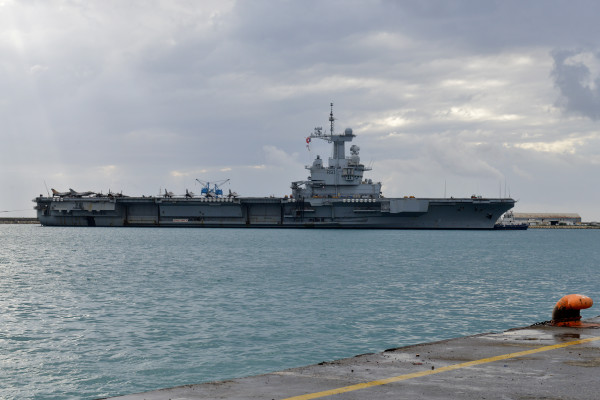

PARIS (Reuters) – France defended its handling of the spread of the coronavirus through its flagship Charles de Gaulle aircraft carrier fleet, after more than a 1,000 sailors tested positive for the disease.
Of the 2,300 sailors in the carrier group, 1,081 had so far tested positive with about 300 results still to be finalised.
Twenty-four crew were in hospital, including one in intensive care, and 545 showing COVID-19 symptoms were being monitored.
The rapid spread of the disease on board the 42-tonne warship with more than 1,700 sailors has raised questions similar to those that arose from an outbreak on board the U.S. carrier Theodore Roosevelt. That led to the firing of a captain who had called for more help, and the resignation of the navy secretary who sacked him.
Several French media outlets have quoted crew members saying there was tension on board the French carrier as the disease spread, after it stopped last month in the French Atlantic Ocean port of Brest and was sent back out to sea.
On Friday, Armed Forces Minister Florence Parly denied one report – from a crew member interviewed by France Bleu radio – that said the captain had offered to halt the mission in Brest, but the ministry had ordered the ship to keep sailing.
“This rumour is false,” Parly told a parliamentary hearing, indicating that as soon as cases were detected on April 7 she took the decision to end the mission.
After the stop in Brest, the ship remained at sea for several more weeks until returning to its Mediterranean home port, Toulon, two weeks ahead of schedule, with 40 sailors on board already showing signs of COVID-19.
“People have to understand that it is out of question to put in danger the crew. Without a crew, it is nothing,” Navy spokesman Eric Lavault told RTL radio late on Thursday.
“The command took all the protective measures and from the Brest stopover there were temperature checks twice a day and questionnaires to trace contacts. But this is not a cruise ship. It’s a warship that wages war against Islamic State,” he said.
Crew from the Charles de Gaulle, its planes and helicopters and the accompanying frigate Chevalier Paul are now in quarantine. The carrier is being disinfected and will sail again in June, Parly said.
Unclear when virus boarded
France, the Western country with the most troops deployed on active mission abroad apart from the United States, has had to weigh the need to protect its soldiers and sailors from the disease against the desire to press on with missions.
The army has already been forced to bring back some soldiers from operations in Africa after they tested positive for the virus, although Parly said only a mission in the Gulf of Guinea had been suspended.
The military is investigating how the coronavirus arrived on board the carrier. Officials say the March 13-16 stopover in Brest, which took place just before France went into lockdown, may have been to blame.
Sailors were allowed to meet their families on land and were seen in restaurants and cafes before returning to the ship, although an initial plan to allow families on board was scrapped. Fifty new sailors also boarded the ship.
She added that a stopover in the Cypriot city of Limassol on Feb 20-21 was also being investigated.
“We still don’t know if the virus was already on board before its stopover on March 13,” Parly said.
“There are several hypotheses. We all have in mind the stopover in Brest between March 13-16, which was just before the confinement,” Parly said.